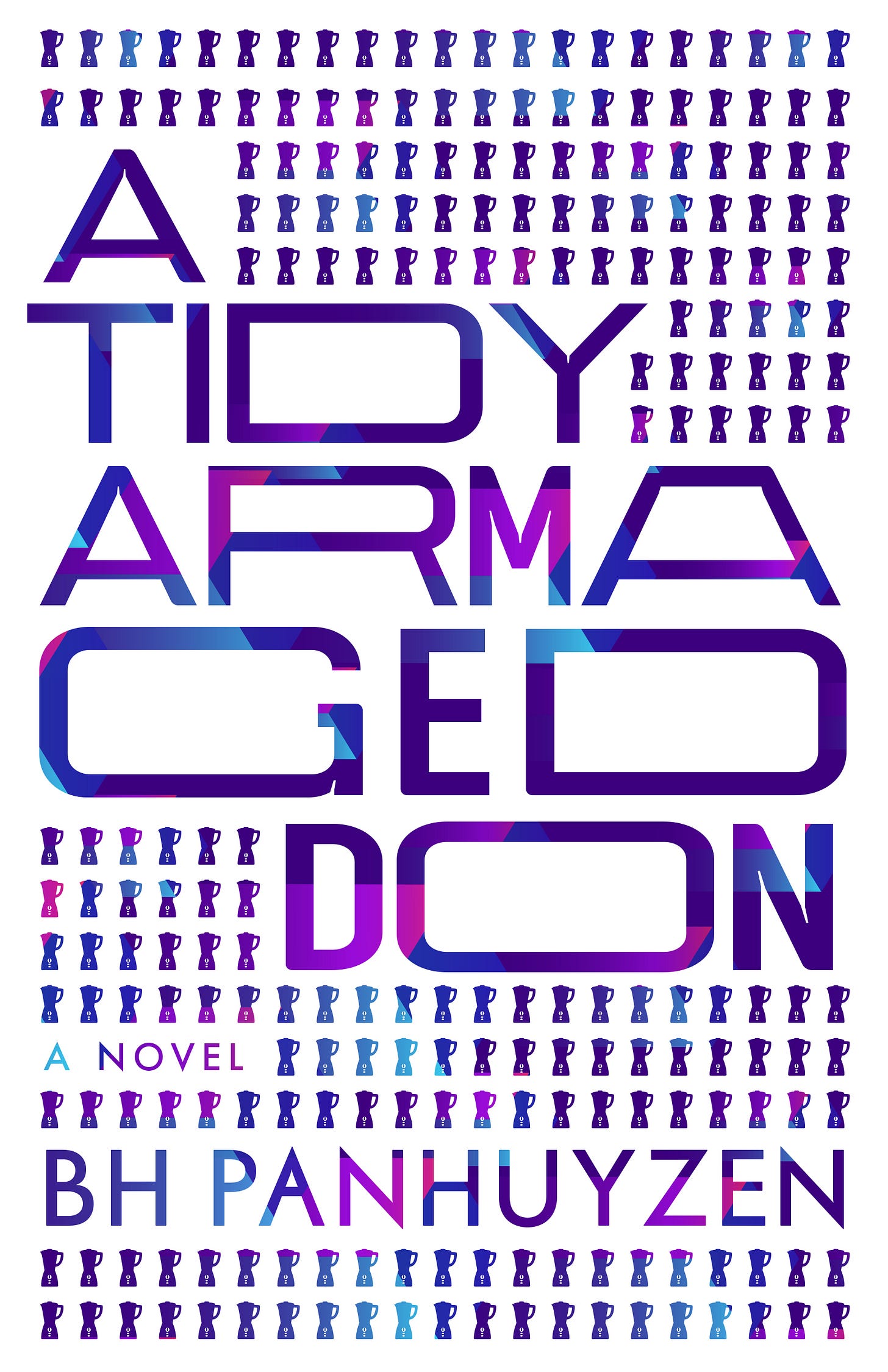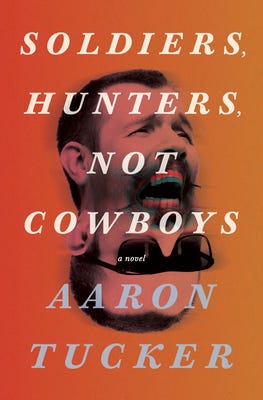Yara by Tamara Faith Berger (2023)
Chrysalis by Anuja Varghese (2023)
Avalanche by Jessica Westhead (2023)
A Tidy Armageddon by BH Panhuyzen (2023)
Soldiers, Hunters, Not Cowboys by Aaron Tucker (2023)
Recently, at a bookish event in Toronto, I was discussing book reviewing with some writerly types. They used to do it, but they don't any more. It's not worth it. They told stories of lost friendships. They said it was hard to be honest. They told horror stories about being poorly reviewed in the past. The reviewers just don't get it, except some do. It's hard, sure, to review a book on a deadline.
Good for you, they said, when I said I review books. Someone needs to.
Then my brother sent me a newish interview with Pete Townshend, The Who's writer/composer, one time guitar smasher. Lot of interesting things in there, but the bit that jumped out for me was Townshend saying he learned in art college that the purpose of art was to generate feedback. To get a response from an audience. "Well, tell me, who are you?" "Join together with the band."
You write a book, you want a response from an audience, do you not?
I see so many links to book events and so few links to commentary about these new books. Is it all just a publicity culture now? Myself, I often don't know what I think about a book until I sit down to write about it. I mean, I know whether I enjoyed it or not, but what do I think?
Here's some short responses to five new Canadian literary titles, starting with Yara by Tamara Faith Berger (2023), as unsettling a book as I've read in many years.
Yara is about Yara, whom we meet as a 19-year-old Brazilian woman, who is about to make a Birthright visit to Israel. This, she thinks, is pretty okay, except it means she has to leave behind her girlfriend, whom she met when she was 15 and the girlfriend was 25. The girlfriend is about to turn 30. We take this situation in through Yara's perspective, and Yara is uncertain how she feels about it all. Her and her girlfriend have had a hot sexual relationship, but things are changing. A trip to Israel might help her sort it out.
And it does and it doesn't. Yara meets a group of Canadians in Israel, including a new friend, Tal, who listens to Yara's story and tells her she's been abused, she's a victim, it's statutory rape, but Yara isn't so sure. Still, she wants to break up with her girlfriend, and she sends her a video of her engaged in a sex act with a boy, filmed by Tal. The immediate effect is Tal and Yara are kicked off the Birthright tour, and Tal invites Yara back to Canada, where Tal's father starts an international lawsuit against Yara's Brazilian girlfriend. More happens but that's more than enough plot spoilers!
Tamara Faith Berger has penned a sharply written novel about sexual power relations and a fraught female coming of age story. There is a lot to be queasy about here, and also lots of remarkable prose revealing layer upon layer of integrated stories.
Anuja Varghese's Chrysalis (2023) won the Governor General's Award for fiction, which surely highlights this remarkable debut short story collection, which mixes literary technique with horror stylings.
Patterned around the theme of transformation (thus the title), the 15 stories in this collection show different elements of contemporary culture — from office microaggressions to outright racism. Some of the stories are touched by magic, visited by the supernatural, and others are more straight ahead realism.
The back cover has representative snapshots:
A couple in a crumbling marriage faces divine intervention. A woman dies in her dreams again and again until she finds salvation in an unexpected source. A teenage misfit discovers a darkness lurking just beyond the borders of her suburban home.
There is much here, fun, earnest, and disconcerting.
Jessica Westhead's slim Avalanche (2023) contains 14 contemporary short stories of keen satire, skewering mostly white women for racial insensitivities. Or as the back cover states, the book:
wryly and earnestly portrays those caught in the wake of a belated awakening to the reality of racism. Writing with compassion and empathy for both her frustrating and frustrated white protagonists and racialized characters who encounter them, Westhead shines light on the obliviousness of people with privilege and the anguished flailing of well-intentioned white ladies desperate to confirm their essential goodness at all costs.
Now, some might reduce "wry and earnest" to "fun and pedantic," indeed on Goodreads there are dueling reviews about whether this book is "preachy." Myself, no, I don't think so. I read the stories as salty and satirical, though one of the purposes of satire is to instruct, so take that as you will.
Readers may share the discomfort of the characters, or they may enjoy seeing them squirm. Overall, it is a brave and challenging book, one that takes full advantages of Westhead's sharpened talents for mapping the contours of social relations. She offers a well-stated, hyperreal portrait of our moment.
BH Panhuyzen, in A Tidy Armageddon (2023), takes us to a near future where all hell has broken loose, except by broken loose I mean "has become highly organized."
The novel follows a band of Canadian soldiers who are ordered into an underground bunker. They assume it's a training exercise, and they assume it's because they aren't the most popular men and women in the force. Still, they're surprised when no one comes to get them, so after a while they break out to the surface and find a world transformed. All the stuff in the world has been stuffed into huge cubes, nine stories by nine stories by nine stories. A cube of watering cans. A cube of keys. A cube of ocean liners.
The soldiers do the soldiery thing, they look for their commanding officer, but no humans remain as far as they can tell. They see animals here and there, as they start to explore deeper. They head for Winnipeg, except Winnipeg isn't there. They head south and find a few strangers, who are less than friendly. They contemplate who (or what) could have created these cubes, even as some of their colleagues meet untimely ends and they're glad to find cubes of canned food.
Part alien story, part road novel, part existential crisis, A Tidy Armageddon forces readers to consider consumer culture and what "stuff" might mean in the big picture. The novel leaves some of the big questions unanswered, so maybe expect a sequel!
Aaron Tucker's novel Soldiers, Hunters, Not Cowboys by Aaron Tucker (2023) offers more travels in hyperreality, channeling the vibes of Don Delillo, as he takes readers through a physical and psychological landscape, while offering film criticism sure to leave one shattered. Ever seen The Searchers (1956)? If not, maybe hold off until after you've read Tucker's latest.
The novel consists of two sections, linked by references to the film, dramatizing its themes. The first section is a drama in two voices: one female, one male. The couple are a former couple, and one is glad for that, especially for her sake.
She invites him to her apartment (it's around his birthday) for a friendly catch-up, where she talks about The Searchers, what it means to her, how her father liked the film, and how she's returned to it through the years with deepening analysis. What do you mean? her friend wants to know, as he gets himself another drink from the kitchen. So she walks him through the movie, which features John Wayne as a former Confederate soldier seeing revenge (and rescue) on the plains for the murder of his brother's family and the kidnapping of his niece by the local Comanche tribe.
Dude is keen on the violence and the revenge plot, but that isn't the story his friend wants to tell, which is deep with unease about violence, men, fathers, and narratives of lone gunmen. At the end of the night, dude stumbles home, and readers pick up his story the next day, when he watches the movie itself and later finds himself in downtown Toronto where thick clouds of smoke are billowing out of the subway or an office building basement.
Emergency vehicles and the military are soon everywhere, cell service is down, and dude decides he needs to return to his friend's apartment — with the handgun she'd said she never wants to see — because she is clearly, in his view, in need of rescue. Lots of reason for unease here. Lots of reason to squirm. Can you not see, dude? Don't you get it? He doesn't, but readers have every chance to see the plot parallels and consider the implications.
Tucker has written a challenging and insightful book.






